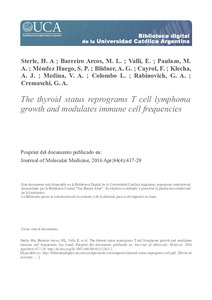Por favor, use este identificador para citar o enlazar este ítem:
https://repositorio.uca.edu.ar/handle/123456789/1449| Título: | The thyroid status reprograms T cell lymphoma growth and modulates immune cell frequencies | Autor: | Sterle, Helena Andrea Barreiro Arcos, María Laura Valli, Eduardo Paulazo, Maria Alejandra Méndez Huergo, Santiago Patricio Blidner, Ada Gabriela Cayrol, María Florencia Díaz Flaqué, María Celeste Klecha, Alicia Juana Medina, Vanina Araceli Colombo, Lucas Luis Rabinovich, Gabriel Adrián Cremaschi, Graciela A. |
Palabras clave: | MEDICINA; GLANDULA TIROIDES; HORMONAS; INMUNOLOGIA; TUMORES | Fecha de publicación: | 2016 | Editorial: | Springer | Cita: | Sterle, H. A, et al. The thyroid status reprograms T cell lymphoma growth and modulates immune cell frequencies [en línea]. Postprint del documento publicado en Jourrnal of Molecular Medicine. 2016, 94 (4). doi:10.1007/s00109-015-1363-2. Disponible en: https://repositorio.uca.edu.ar/handle/123456789/1449 | Resumen: | Abstract: In spite of considerable evidence on the regulation of immunity by thyroid hormones, the impact of the thyroid status in tumor immunity is poorly understood. Here, we evaluated the antitumor immune responses evoked in mice with different thyroid status (euthyroid, hyperthyroid, and hypothyroid) that developed solid tumors or metastases after inoculation of syngeneic T lymphoma cells. Hyperthyroid mice showed increased tumor growth along with increased expression of cell cycle regulators compared to hypothyroid and control tumor-bearing mice. However, hypothyroid mice showed a higher frequency of metastases than the other groups. Hyperthyroid mice bearing tumors displayed a lower number of tumor-infiltrating T lymphocytes, lower percentage of functional IFN-γ-producing CD8+ T cells, and higher percentage of CD19+ B cells than euthyroid tumor-bearing mice. However, no differences were found in the distribution of lymphocyte subpopulations in tumor-draining lymph nodes (TDLNs) or spleens among different experimental groups. Interestingly, hypothyroid TDLN showed an increased percentage of regulatory T (Treg) cells, while hyperthyroid mice displayed increased number and activity of splenic NK cells, which frequency declined in spleens from hypothyroid mice. Moreover, a decreased number of splenic myeloid-derived suppressor cells (MDSCs) were found in tumor-bearing hyperthyroid mice as compared to hypothyroid or euthyroid mice. Additionally, hyperthyroid mice showed increased cytotoxic activity, which declined in hypothyroid mice. Thus, low levels of intratumoral cytotoxic activity would favor tumor local growth in hyperthyroid mice, while regional and systemic antitumor response may contribute to tumor dissemination in hypothyroid animals. Our results highlight the importance of monitoring the thyroid status in patients with T cell lymphomas. | URI: | https://repositorio.uca.edu.ar/handle/123456789/1449 | ISSN: | 0946-2716 | Disciplina: | MEDICINA | DOI: | 10.1007/s00109-015-1363-2 | Derechos: | Acceso Abierto. 1 año de embargo | Fuente: | Postprint del documento publicado en Jourrnal of Molecular Medicine. 2016, 94 (4). doi:10.1007/s00109-015-1363-2 |
| Aparece en las colecciones: | Artículos |
Ficheros en este ítem:
| Fichero | Descripción | Tamaño | Formato | |
|---|---|---|---|---|
| thyroid-status-reprograms-cell.pdf | 10,09 MB | Adobe PDF |  Visualizar/Abrir |
Visualizaciones de página(s)
206
comprobado en 27-abr-2024
Descarga(s)
334
comprobado en 27-abr-2024
Google ScholarTM
Ver en Google Scholar
Altmetric
Altmetric
Este ítem está sujeto a una Licencia Creative Commons

